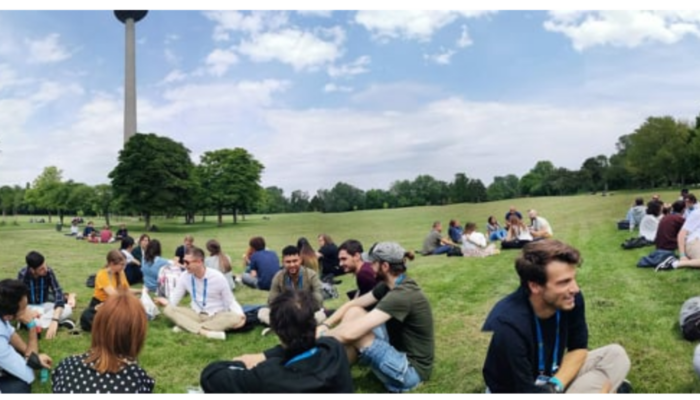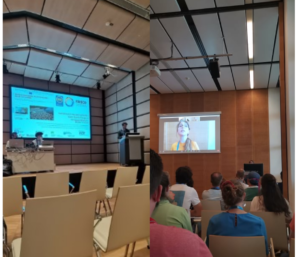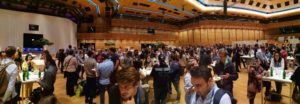
As part of the NH Division blog editorial team, we, Joana and Shreya, describe our experience at the EGU General Assembly (GA) 2022 (#EGU22), held in the Austria Centre in Vienna, from May 24th-28th. It was the first hybrid conference we attended in-person after two years of the pandemic, with a footfall of more than 7,000 people and about the same number joining virtually. It was an enriching experience to see everyone again and meet new people. Despite the challenges of COVID-19, EGU managed to run both scientific and non-scientific sessions in a very well organised and time-bound format, presenting a unique experience to everyone. EGU is always keen on reducing the GA’s carbon footprint; thus, the conference programme was accessible online only from the web browser. They also provided information about eco-friendly accommodations close to the conference centre and encouraged participants to use bicycles, trains, and metros whenever possible.
The conference
The EGU GA’s scope has always been to bring together geoscientists from all over the world to one meeting covering all Earth, Planetary, and Space Sciences disciplines. In addition, it provides a great networking platform and opportunities to learn soft skills for any career stage. EGU22 was all that, and we think it was outstanding without exaggeration. The EGU22 was the first attempt to run a hybrid format in EGU history. Some things have worked great; others, like technical issues, had to be improvised quickly. We had to handle the sound system and computer technical issues at the same time! For example, when the sound system failed for people at home, we had to write in chat at the same time that we were talking!
This year, we had the opportunity to convene a Scientific Session (Joana) and EDITH’s Tectonics and Structural (TS) session (Shreya). The Scientific Sessions worked as short oral presentations of 5-7 minutes for each abstract and its discussion with the audience. Convening it was different from 2019 (the last entirely in-person conference) since we had to moderate a virtual and an in-person room at the same time. It was a challenge! Primarily due to some technical issues that were beyond our knowledge to solve. But! We adopted the motto: Patient and resilience is the way! And at the end, everything ran smoothly, and everyone felt included in the session. The EDITH’s TS session is dedicated to discussing Equality, Diversity, and Inclusion within the research of TS. This session ran without hassle and issues with brilliant co-conveners and tech support.
The sessions/events
The EGU22 was rich in scientific and non-scientific content covering a wide range of topics. A total of 791 sessions were held in the hybrid format. These sessions were on a wide range of different topics and types. For example, in Scientific Sessions (Figure 1a), the participants had the opportunity to present their work, discuss it with other colleagues, and extend their networking. Also, we could attend very interesting Short-Courses (Figure 1b) to improve our knowledge of some methods or tools (for example, on using specific cartographic software or how to write and review papers) and to exchange thoughts on particular topics (for example, how to get funding or how to do outreach). For example, three of our favourite Short-Courses (SC) were “How to make a beautiful study area map with QGIS?”, “Outreach: how to get your science out there?” and “Careers inside and outside of academia: Panel Discussion”. During the first SC, the attendees could get great tips on how to get a great cartographic design using QGIS and put their hands on the job. It was very enriching, even for those of us that had already been using the software for a while. The second SC showed us how to improve our soft and hard skills (for example, how to use creativity to communicate our work and find collaborations doing outreach) during our free time. It was very inspiring to know that we can do much more besides scientific papers with what we research (for example, theatre, blogs or illustrations). Finally, in the third SC, we could discuss different career paths of people that went in and out of academia. It was very interesting to know that it is not impossible to stop a period of academia and come back again and that our soft and hard skills can be used in a non-academic job.

Figure 1 – a) Scientific session. b) Short-course.
Networking events
The EGU22 provided a great platform for all the attendees, especially Early Career Scientists, to connect and engage with people with the same and different research interests through several networking events (Figure 2). For example, our Division ECS Representative, in collaboration with other Divisions’ Representatives, had organised a lunch at a park near the conference centre, allowing us to meet and expand our network in a relaxed way. It was really lovely to meet people from other Divisions with the same interests in life. In addition, the #EGU22 provided numerous coffee, tea and milk spots around the conference centre, where people could get along for how long they wanted. We particularly liked the area on the 3rd floor furnished with tables to work on if needed and sofas to relax and rest. Finally, during the entire five days, several sponsors and exhibitors showcased their services, sharing their knowledge, experience and opportunities. These exhibition events are an important asset for people to learn about new technologies and services available to support their research and eventually take a break from scientific sessions, relax and move a bit. The NASA exhibition booth called out a great crowd where they discussed the latest revelations from Jupiter during the press conference.

Figure 2 – Early Career Scientists Reception.
Overall, we had a very productive and valuable experience at the EGU22 in Vienna. The conference opened several doors for potential collaborations and cutting-edge research. We look forward to the EGU General Assembly 2023 AGAIN!!
Did you attend the EGU GA 2022 in-person or virtually? What did you like the most? What would you like to see improved for the next year? If you haven’t filled out the feedback survey, take the chance at the following link: EGU22 Feedback.
Post edited by Valeria Cigala, Gabriele Amato.
